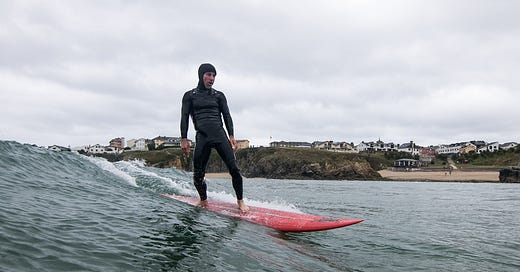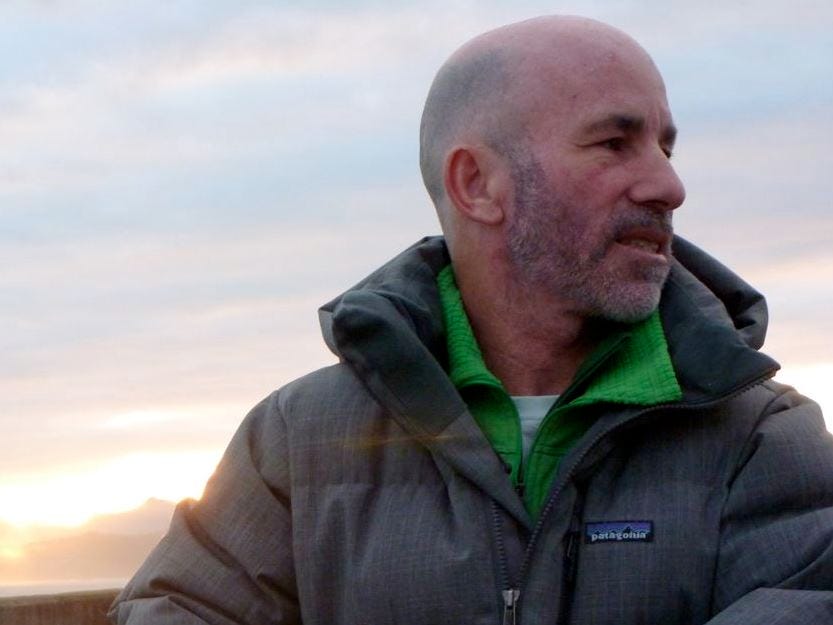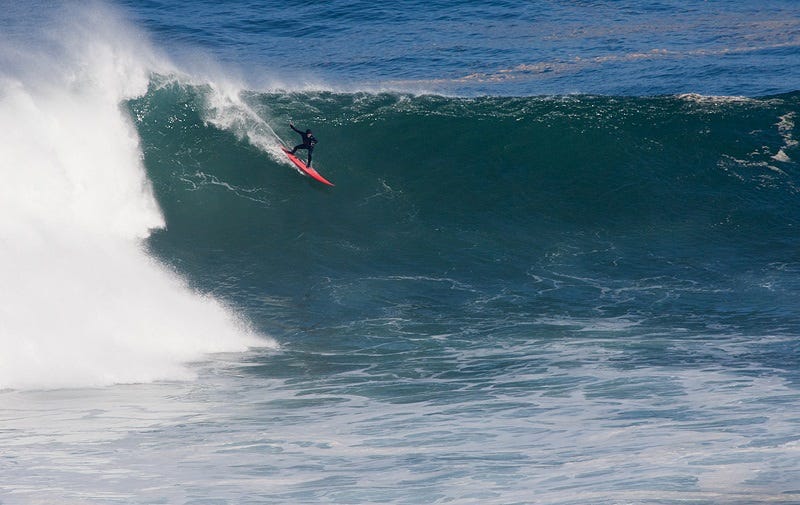“Big wave surfing is now about jet skis and fossil fuels… "
An interview with oceanographer, big wave surfer and environmental advocate Dr Tony Butt
“You see a picture of a guy on a 100ft wave at Nazaré but there will be 15-20 jet skis buzzing around below and the people standing on top of the cliff can smell the petrol fumes from right up there.”
Dr Tony Butt is a big wave surfer and ocean scientist from the UK, who lives in Northwest Spain. He has a PhD in Oceanography and has published 16 peer-reviewed papers and three books. Tony has long advocated that surfers should step up more when it comes to protecting the ocean and coastal environments, and has worked with Surfers Against Sewage, and Save The Waves Coalition to that end. I was lucky enough to meet and hang out with Tony at the Patagonia Surf Impact Camp last April in Hossegor. I found him warm, wise and inspiring and I hope you enjoy this chat.
Hey Tony, how’s the surf been lately?
Mostly 3ft here. Before the pandemic, I went to South Africa every year during European summer. I had 36 winters in a row, so I can’t complain. But it’s funny, as surfing is such an addiction you want more the whole time. Though I’m not as narrow-minded as I was before. If it’s only 2-3 foot, I can still surf, I just need to use a different board. I’ll never be a good small wave surfer but I’m enjoying myself and keeping fit at the same time.
Why haven’t you been back to South Africa post-pandemic?
I couldn’t really justify the long-haul flight just to go surfing, if there wasn’t some environmental work involved. There are also a lot of problems there, which could be a sign of things to come for us all. Severe drought, and the electricity infrastructure is physically deteriorating, but the country doesn’t have the money to repair it. They’ve introduced load shedding, where in effect you rotate power cuts between different towns.
Has there been a specific moment where you’ve felt like the environmental crisis was really upon us?
Not a single moment, it keeps coming in these moments of shock, like the floods in Pakistan or graphs showing atmospheric CO2 levels or the death of phytoplankton. I’ve been aware of the environmental problems we face for a long time. I was writing about it in The Surfer's Path well over 20 years ago. TSP was one of the first mags to put an environmental twist on surfing and credit to Alex Dick-Read [the editor] for that.
It’s more difficult these days to get the surf media to publish that kind of writing. They have different models, pressure from owners and shareholders and as they have all these metrics about reader numbers, they can prove environmental articles don't bring in the readers compared to say: ‘The biggest wave ever towed into!’ or ‘Four kids go to Indo and get some tubes!’.
Do you feel like more people are aware of what’s happening?
Where I live, I’m surrounded by nice people, who don’t have a scientific background or read a lot, and they seem to think everything is ok, we can keep burning fossil fuels and nothing is going to happen. Then you read the IPCC reports and it’s a lot more pessimistic. I’m inclined to think it is a lot worse than most people imagine.
Were you impacted by the European heatwaves this summer?
No, I live on the north coast of Spain just in front of the Cantabrian mountains. We were lucky as we were the only place in Spain that didn’t get those temperatures, we’re like the last frontier. No wildfires either, which is fortunate as we have eucalyptus all around us and it’s highly flammable.
What do you think the consequences of the climate crisis will be for surfing?
It’s hard to imagine things before they happen but I don’t think the waves are going to change as such, it will be other things that stop us surfing as we do today. It’ll be a lot warmer, and we might not be able to fly as it could be too expensive or there could be energy rationing. So more like the pandemic in that sense, where we have to change our philosophy on surfing and try to enjoy ourselves at spots nearer to home.
In modern life, we are pretty removed from nature, can surfing help bring that connection back?
If you strip it down, surfing is reacting to whatever the sea throws at you. You can’t change the way the waves are going to come and so you’re learning about nature in a direct way, something which happens a lot less these days. I saw a thing recently about the last generation of fishermen, and how they had to understand the behaviour of fish to know where their catch would be, whereas this generation (their kids) just need to know how to programme the GPS and fish finding machine.
While surfing, you’re out there in the sea appreciating things money can’t buy, and as surfers we ought to instinctively understand a bit more about the nature around us and how we as humans are not really taking care of it. But maybe that’s me living in cloud cuckoo land, as you often talk to surfers, and they don’t seem to understand that.
How so?
Surfing big waves seems to have gone the opposite way from what it was in the beginning. It’s now about jet skis and fossil fuels. You have this machine to drive around, which makes lots of noise and pollutes the sea. You see a picture of a guy on a 100ft wave at Nazaré but there will be 15-20 jet skis buzzing around below and the people standing on top of the cliff can smell the petrol fumes from right up there.
Flying to the other side of the world for one strike mission swell and then coming back again, it really is the antithesis of what it should be. And that’s how the public see surfers, as people who pursue this selfish activity, and not as environmental ambassadors. But it could be so different if we could start a movement in the other direction.
How might that look?
A friend and I found this place we didn’t think anyone had surfed before. It took us three attempts to get out there, as we couldn’t get through the beach break to the reef, then we got out one day, got one wave each and managed to get back in. It was one of the most intense and fantastic surf experiences I’ve ever had in going on 40 years. As we paddled in there was a guy playing bagpipes on the cliff, it felt like a requiem for the kind of surfing experience younger kids don’t get anymore.
Surfing is intrinsically sustainable because you just use the energy the wave gives you without depleting the energy of the wave significantly, as it’s such a tiny amount of energy compared with the wave itself. And surfers are like an indicator species. We’re affected first as we’re on the front line, and we see things happening in the environment before people in cities do, whether that is pollution or changes in river flow that might affect the sand bar or whatever it is the wave breaks on.
Surfers might be more interested in saving a surfing wave for selfish reasons as they won’t be able to surf there anymore but without realising, they’ll be able to save the rest of the environment as well.
How can surfers help?
Read more about what’s going on. Try not to be afraid of articles that paint a dismal picture of things. Then try and think of what you can do to help and spread the message about what needs to be done. Have a look at what the NGOs, such as Save the Waves Coalition and Surfers Against Sewage, are doing, but also try to think of other ways you can use your skills.
Read more about Dr Tony Butt’s work here.
Please fwd this newsletter to anyone who you think might be interested & if you want to commission me to write about any of these topics please get in touch.
Other news:
Here’s a recent piece I did for Huck Magazine on the activists fighting back against raw sewage dumping through payment boycotts and direct action.
I’m very much looking forward to attending the Blue Earth Summit in Bristol next month. Find out more about the event here.






Hey Sam! Looking forward to seeing this unfold